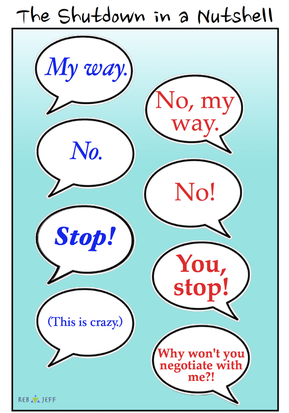
The story is about Rabbi Eliezer, who knew that he was right and that everyone else was wrong. He knew that the "Oven of Achnai" was a special cooking vessel that would always be kosher, no matter what. The other rabbis disagreed and said the opposite. The Oven of Achnai, according to them, was actually unclean and food cooked in it would never be kosher. They couldn't both be right.
Rabbi Eliezer was a genius of Jewish law, and he knew it. He was said to have tremendous powers because of his deep knowledge of God. He pulled out every possible proof to show that his oven was ritually clean. He caused rivers to run backwards, trees to walk, and buildings to nearly collapse. But the other rabbis still refused to accept his ruling. Eliezer, so certain that he was right, would not submit to the rule of the majority. In the end, it didn't matter. He was simply outvoted.
Having defeated Rabbi Eliezer, and still angry about his arrogant defiance, the other rabbis took a further step. In his absence, they ruled that everything that Rabbi Eliezer had ever ruled to be ritually clean would now be considered ritually unclean. They even expelled him from the Sanhedrin, the council of sages.
Only one man, Rabbi Akiva, understood the danger of insulting Rabbi Eliezer in this way. Akiva knew that Rabbi Eliezer was such a powerful master of Torah that insulting him could bring about a plague that would destroy the world. He went to visit Rabbi Eliezer to tell him what had been done. Akiva broke the news as gently as he could. He even tried to make it sound like the rest of the rabbis had resigned, rather than admit that they had tossed him out. Because of Rabbi Akiva's compassionate approach, the plague was limited. Only a third of the world's olive, wheat and barley crops were destroyed.
When leaders become so certain that they are right, and so determined not to allow others to succeed, bad things can happen. When beating your opponent into the ground becomes more important to you than protecting what is good for all, disaster is not far behind.
Rabbi Eliezer was so obsessed in his determination to be proven right that he lost sight of the greater good. He refused to honor majority rule and, worse, he put his ego above everything else. Eliezer's arrogance, in the end, was the cause of his own downfall and the cause of suffering for many others.
The other rabbis of the Sanhedrin were not much better. They fell victim to their desire for revenge. They forgot to be humble in victory, and they forgot how much their incivility could come back to haunt them.
Today in Washington, the government of the most powerful country in the world has been brought to its knees by people who, like Rabbi Eliezer, refuse to see beyond their own egos and agendas. They refuse to let the rule of law prevail. Shame on them. The situation will only get worse, though, if today's stubbornness next turns into angry finger-pointing with calls for revenge. We could be at the beginning, not the end, of a self-fulfilling cycle of recrimination and vengeance. It could get a lot uglier quickly if no one is willing to stop the cycle by backing away from anger and self-righteous certainty.
I'm not a politician and I don't claim to have expertise on healthcare policy, debt limits, or the rules of parliamentary procedure. But I do know something about the human heart, and so did the rabbis of the Talmud. If the fight over defunding Obamacare doesn't end soon, and if members of Congress continue to put more energy into embarrassing each other than into actually governing, we are all doomed. The Talmud's legend of failed olive, wheat and barley harvests will be repeated in a very real calamity to our economy and our ability to have a working government.
And it's not just Congress. Our entire society is being strangled by the disease of pathological certainty. We each watch, read and hear only the media that reinforce our own beliefs. We become convinced that the "other side" is made up entirely of people who are selfish, foolish and evil. We have stopped listening to each other and we have learned to justify any tactic that will attack, embarrass or undermine our opponents, even if the price is wide-scale suffering for all.
It is time to stop the plague before it gets worse.
Other Posts on This Topic:
The Problem with Certainty
Shoftim: Pursuing Justice Justly

 RSS Feed
RSS Feed
